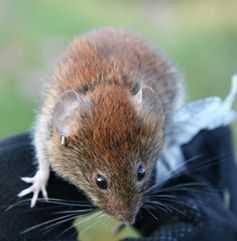The rodent mothers are more likely to become pregnant after smelling odors produced by conspecific males frightened by predators

Credit: University of Jyvaskyla
Reproducing in a fearful world is tricky. How do rodents get information of prevailing risk of death, and how do they respond to the information? A research team of evolutionary biologists from University of Jyväskylä, Finland and University of Vienna, Austria reported that rodent mothers are more likely to become pregnant after smelling odors produced by conspecific males frightened by predators. The study was published on 7th of June 2019 in the open access journal Ecosphere.
If your neighbor is scared, this means that danger is near and acute. One evolutionary solution is to speed reproduction in hope that one of your offspring survives. These results bring new information about the proximate and ultimate explanations of small mammal behavioral responses under predation risk.
Fear of being eaten has the power to shape populations and drive evolution. The effect the authors report is large: mothers exposed to scared males had a higher successful insemination rate compared to unexposed control mothers.
Chemical messages
Predation involves more than just predators consuming prey. The study shows that voles are able to determine the difference between the smell of a predator, the smell of a non-stressed vole, and the smell of a vole who encountered a predator.
The ability to distinguish between these cues allows voles to make a more nuanced risk assessment of their current environment. The authors argue that voles perceive the odor of a fearful conspecific to be more reliable as an indicator of acute danger than the pure cue of predator presence in the breeding area. This olfactory “eavesdropping” allows voles to make use of the experiences of conspecifics around them.
When the risk of death is high, it may be better to invest in offspring. Females changed their reproductive strategy from cautious to risky, towards terminal investment, after encountering the smell of a fearful vole.
Implications of the findings
Professor Perter Banks and researcher Catherine Price from the University of Sydney, both working on predator-prey relationships, commented these findings:
“The finding that indirect cues of predation can have such profound influences on animal reproduction is really very interesting. There has been recent evidence that animals can use information from other non-predator individuals to assess their predation risk. But this experiment demonstrates how olfactory “eavesdropping” on scared conspecifics within a population can lead to impacts on breeding and potentially population-level processes. Even more interesting is that this information is passed between individuals socially which has some interesting consequences for the evolution of such communication.”
###
The study was conducted at Konnevesi Research Station of the University of Jyväskylä, Finland and is published 7th of June 2019 in the open access journal Ecosphere.
Article: Sievert, T., M. Haapakoski, R. Palme, H. Voipio, and H. Ylönen, 2019 in open access journal Ecosphere: “Secondhand horror: Effects of direct and indirect predator cues on behavior and reproduction of the bank vole”
Link to article: http://onlinelibrary.
More Information:
Doctoral student Thorbjörn Sievert , [email protected]
Professor Hannu Ylönen, [email protected], tel. +358 50 539 9542
Postdoctoral researcher Marko Haapakoski, [email protected], tel. +358 50 301 0756
Media Contact
Marko Haapakoski
[email protected]
Related Journal Article
http://dx.




